The Tale of Ma'at
Reading time: 9 min
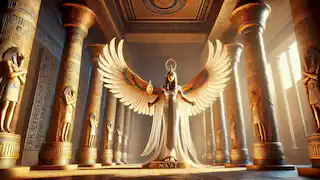
About this story: The Tale of Ma'at is a Myth from Egypt set in the Ancient This Dramatic tale explores themes of Justice and is suitable for All Ages. It offers Cultural insights. Journey into the heart of ancient Egypt with the timeless tale of Ma'at, the goddess of truth, justice, and balance. As the world rises from chaos under the light of Ra, Ma'at weaves the delicate threads of harmony that bind the cosmos. Explore the rise and fall of temples, the trial of gods, and the souls weighed in the afterlife—where the Feather of Ma'at determines eternal fates. Will justice prevail, or will chaos consume? Discover the legacy of balance that shaped an empire.
In the land of Egypt, long before the pyramids towered over the Nile, there existed a deep understanding of balance and order. The gods of Egypt, powerful and revered, guided humanity in ways both visible and unseen. Chief among them was Ma'at, the goddess of truth, justice, harmony, and balance. Her influence reached into every corner of the world, touching the lives of kings and commoners alike, ensuring that the scales of life were kept in equilibrium.
Ma'at was not a goddess of thunderous wrath or dazzling displays of power; instead, her strength lay in the quiet, unyielding order that governed the universe. Her wings spread across the cosmos, her feather—the famous Feather of Truth—became a symbol that defined the afterlife for all Egyptians. To live according to Ma'at was to live a life of truth, to respect the balance of nature, and to strive for justice in all matters, great and small.
The Creation of Ma'at
The story of Ma'at begins at the dawn of creation. Ra, the sun god, emerged from the waters of chaos at the beginning of time, bringing light and life to the world. He saw that without structure, the world would be consumed by the darkness of chaos, so Ra called upon the essence of balance to ensure that creation would endure. From this divine call, Ma'at was born, her presence ensuring that the world remained in harmony.
Ma'at was not just a force but a principle, a law of nature that governed the gods and mortals alike. Her very existence was the embodiment of universal order, which Ra cherished dearly. It was she who guided the stars in their eternal paths, ensured the Nile's flooding brought life instead of destruction, and oversaw the daily judgment of souls in the afterlife.
The Feather of Ma'at
The Feather of Ma'at was one of the most sacred symbols in all of Egypt. When mortals died, their hearts were weighed against Ma'at's feather in the Hall of Judgment, overseen by the god Osiris. The heart, believed to hold a person’s essence, had to be as light as the feather. If the scales tipped in favor of the feather, the soul was allowed to pass into the Field of Reeds, an eternal paradise. But if the heart was heavy with wrongdoing, it was devoured by the monstrous Ammit, a creature part lion, part hippopotamus, and part crocodile.
Throughout the centuries, Egyptians lived with the understanding that their actions in life would be weighed by Ma'at. Honesty, integrity, and respect for the natural order were more than virtues—they were a divine mandate. Pharaohs, in particular, were seen as the earthly embodiments of Ma'at, tasked with maintaining order in the land.
Ma'at and the Pharaohs
Ma'at was integral to the concept of kingship in ancient Egypt. Pharaohs were often depicted offering Ma'at to the gods as a symbol of their commitment to maintain balance and harmony in the world. They were seen as intermediaries between the gods and the people, and their primary duty was to uphold Ma'at in all aspects of life.
The legacy of Pharaoh Hatshepsut, one of Egypt’s most powerful female rulers, illustrates the importance of Ma'at in governance. Hatshepsut ruled as Pharaoh in a time when female rulers were a rarity. She claimed legitimacy not only through her royal lineage but by positioning herself as a living incarnation of Ma'at. She emphasized peace and prosperity, restoring temples and building monuments that celebrated the goddess. Through Hatshepsut’s rule, the people of Egypt experienced a period of great stability, a testament to Ma'at’s influence.
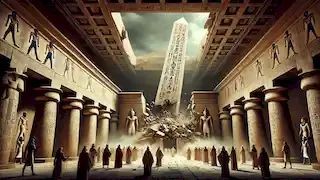
But not all rulers respected the balance Ma'at required. The story of Pharaoh Akhenaten, who sought to elevate the worship of the sun god Aten above all other deities, provides a cautionary tale. His radical religious reforms disrupted the traditional order of Egypt, and in doing so, he challenged the principles of Ma'at. After his death, the old ways were swiftly restored, and Akhenaten’s name was almost erased from history. His reign served as a stark reminder that those who defy Ma'at would face chaos and oblivion.
The Fall of the Sacred Temple
One of the most legendary stories involving Ma'at comes from the ancient city of Waset, known today as Thebes. During the reign of Pharaoh Amenhotep III, the city was a beacon of Egyptian culture and religious devotion. At the heart of Waset stood a magnificent temple dedicated to Ma'at and the god Amun-Ra. Pilgrims traveled from far and wide to offer their prayers, hoping that by doing so, they would find favor in both this life and the next.
However, as the years passed, greed began to infiltrate the priesthood of Waset. The priests, once devoted to Ma'at’s teachings, started to enrich themselves at the expense of the people. They accepted bribes, distorted justice, and manipulated the sacred rituals to suit their personal ambitions. The delicate balance that Ma'at represented was threatened as corruption seeped into the heart of the temple.
One fateful day, a terrible omen appeared: the great obelisk that marked the entrance to the temple began to crumble. This event was seen as a sign that Ma'at had withdrawn her favor. Without balance, the city of Waset would fall into ruin. The people, now fearful for their future, pleaded with the priests to restore order, but the priests were too consumed by their greed to heed the warnings.
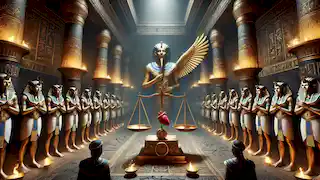
As Ma'at’s influence faded from the city, chaos took hold. The Nile’s annual flooding became erratic, either failing to nourish the land or drowning the crops in violent torrents. Famine spread across the region, and the once-thriving city of Waset fell into despair. Eventually, the temple itself was swallowed by the desert, leaving behind only a cautionary tale of what happens when the principles of Ma'at are abandoned.
The Judgment of the Gods
Another significant aspect of Ma'at’s tale revolves around the gods themselves. Though immortal, the gods of Egypt were not exempt from Ma'at’s order. Even they could be judged for their actions, as is seen in the story of the trial of Set.
Set, the god of chaos and the desert, was often at odds with Ma'at. His nature was in direct opposition to her teachings, and his rivalry with his brother Osiris only deepened the divide. When Set murdered Osiris in a bid to claim the throne of Egypt, it was Ma'at’s principles that were called upon to determine the rightful ruler.
Horus, the son of Osiris, challenged Set for the throne, and their battle raged across both the heavens and the earth. Eventually, the gods decided to hold a tribunal, overseen by Ma'at, to determine who was worthy of ruling Egypt. Ma'at’s scales were brought forth, and the deeds of both Set and Horus were weighed.
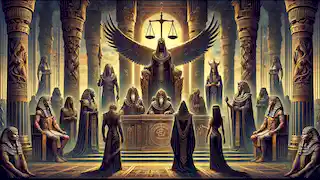
Despite Set’s strength and cunning, his actions had thrown Egypt into disarray. He had defied Ma'at’s principles, sowing discord and injustice. Horus, though young and at times impetuous, had fought to restore balance and uphold the order his father had maintained. In the end, the scales tipped in favor of Horus, and Ma'at decreed that he should be the rightful ruler of Egypt. Set was cast into the desert, where he continued to embody chaos, but he was forever bound by the laws of Ma'at.
Ma'at in the Afterlife
The influence of Ma'at extended beyond the mortal realm and the governance of Egypt; she also played a crucial role in the afterlife. The Egyptians believed that upon death, every soul would stand before the god Osiris in the Hall of Judgment. Here, Ma'at’s scales would determine the fate of the deceased.
Souls were required to recite the "Negative Confessions" before the gods, proclaiming their innocence of various sins such as lying, stealing, and causing harm. These confessions were not simply statements of denial; they were affirmations of a life lived according to Ma'at’s principles.
If a soul’s heart was light, free from the burden of sin, it would pass the test and be welcomed into the Field of Reeds, a paradise where the dead could live for eternity in peace and joy. But if a heart was heavy, weighed down by dishonesty, injustice, or cruelty, it would be cast into oblivion.
The finality of this judgment underscores the importance of living in accordance with Ma'at during one’s life. It was a reminder that the truth could not be hidden, and that balance and justice would always prevail, even in the afterlife.

The Legacy of Ma'at
Ma'at’s legacy has endured for millennia, both as a goddess and as a concept that shaped Egyptian civilization. Her principles of truth, justice, and balance became the foundation of Egyptian law, governance, and morality. Even after the decline of the ancient Egyptian empire, the idea of Ma'at continued to influence other cultures and belief systems, echoing through history as a universal symbol of order and righteousness.
Today, Ma'at’s feather is still recognized as a symbol of justice, and her teachings continue to inspire those who seek to live a life of balance and integrity. Though the temples may have crumbled and the gods faded from everyday worship, the principles of Ma'at remain eternal, as enduring as the stars in the night sky.
In the end, Ma'at’s story is not just one of gods and goddesses, but of the timeless struggle between order and chaos, truth and deception, justice and tyranny. It is a story that resonates with all who seek to create a world that reflects the balance and harmony of the universe itself.
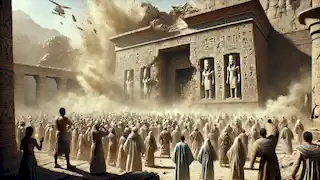
Conclusion
The Tale of
Ma'at reminds us of the delicate balance that governs the world, the importance of living a life of truth, and the power of justice. In the ancient Egyptian world, Ma'at was not just a deity to be worshipped but a fundamental principle that held the universe together. Her legacy endures in the stories of the pharaohs, the myths of the gods, and the teachings that continue to inspire people to this day.


















